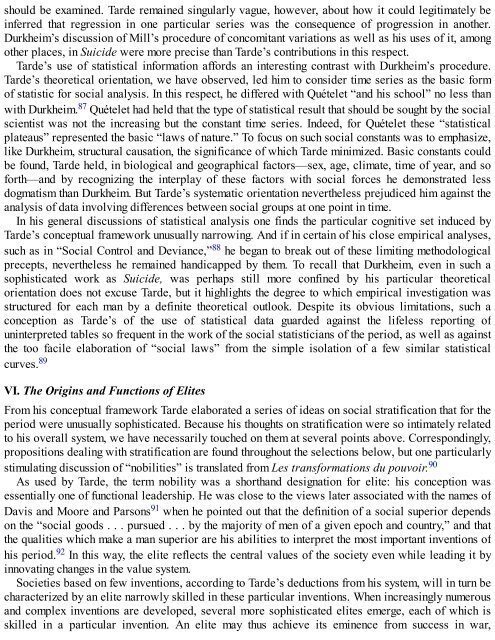3658925934
Create successful ePaper yourself
Turn your PDF publications into a flip-book with our unique Google optimized e-Paper software.
should be examined. Tarde remained singularly vague, however, about how it could legitimately be<br />
inferred that regression in one particular series was the consequence of progression in another.<br />
Durkheim’s discussion of Mill’s procedure of concomitant variations as well as his uses of it, among<br />
other places, in Suicide were more precise than Tarde’s contributions in this respect.<br />
Tarde’s use of statistical information affords an interesting contrast with Durkheim’s procedure.<br />
Tarde’s theoretical orientation, we have observed, led him to consider time series as the basic form<br />
of statistic for social analysis. In this respect, he differed with Quételet “and his school” no less than<br />
with Durkheim. 87 Quételet had held that the type of statistical result that should be sought by the social<br />
scientist was not the increasing but the constant time series. Indeed, for Quételet these “statistical<br />
plateaus” represented the basic “laws of nature.” To focus on such social constants was to emphasize,<br />
like Durkheim, structural causation, the significance of which Tarde minimized. Basic constants could<br />
be found, Tarde held, in biological and geographical factors—sex, age, climate, time of year, and so<br />
forth—and by recognizing the interplay of these factors with social forces he demonstrated less<br />
dogmatism than Durkheim. But Tarde’s systematic orientation nevertheless prejudiced him against the<br />
analysis of data involving differences between social groups at one point in time.<br />
In his general discussions of statistical analysis one finds the particular cognitive set induced by<br />
Tarde’s conceptual framework unusually narrowing. And if in certain of his close empirical analyses,<br />
such as in “Social Control and Deviance,” 88 he began to break out of these limiting methodological<br />
precepts, nevertheless he remained handicapped by them. To recall that Durkheim, even in such a<br />
sophisticated work as Suicide, was perhaps still more confined by his particular theoretical<br />
orientation does not excuse Tarde, but it highlights the degree to which empirical investigation was<br />
structured for each man by a definite theoretical outlook. Despite its obvious limitations, such a<br />
conception as Tarde’s of the use of statistical data guarded against the lifeless reporting of<br />
uninterpreted tables so frequent in the work of the social statisticians of the period, as well as against<br />
the too facile elaboration of “social laws” from the simple isolation of a few similar statistical<br />
curves. 89<br />
VI. The Origins and Functions of Elites<br />
From his conceptual framework Tarde elaborated a series of ideas on social stratification that for the<br />
period were unusually sophisticated. Because his thoughts on stratification were so intimately related<br />
to his overall system, we have necessarily touched on them at several points above. Correspondingly,<br />
propositions dealing with stratification are found throughout the selections below, but one particularly<br />
stimulating discussion of “nobilities” is translated from Les transformations du pouvoir. 90<br />
As used by Tarde, the term nobility was a shorthand designation for elite: his conception was<br />
essentially one of functional leadership. He was close to the views later associated with the names of<br />
Davis and Moore and Parsons 91 when he pointed out that the definition of a social superior depends<br />
on the “social goods . . . pursued . . . by the majority of men of a given epoch and country,” and that<br />
the qualities which make a man superior are his abilities to interpret the most important inventions of<br />
his period. 92 In this way, the elite reflects the central values of the society even while leading it by<br />
innovating changes in the value system.<br />
Societies based on few inventions, according to Tarde’s deductions from his system, will in turn be<br />
characterized by an elite narrowly skilled in these particular inventions. When increasingly numerous<br />
and complex inventions are developed, several more sophisticated elites emerge, each of which is<br />
skilled in a particular invention. An elite may thus achieve its eminence from success in war,









![Genki - An Integrated Course in Elementary Japanese II [Second Edition] (2011), WITH PDF BOOKMARKS!](https://img.yumpu.com/58322134/1/180x260/genki-an-integrated-course-in-elementary-japanese-ii-second-edition-2011-with-pdf-bookmarks.jpg?quality=85)
![Genki - An Integrated Course in Elementary Japanese I [Second Edition] (2011), WITH PDF BOOKMARKS!](https://img.yumpu.com/58322120/1/182x260/genki-an-integrated-course-in-elementary-japanese-i-second-edition-2011-with-pdf-bookmarks.jpg?quality=85)





